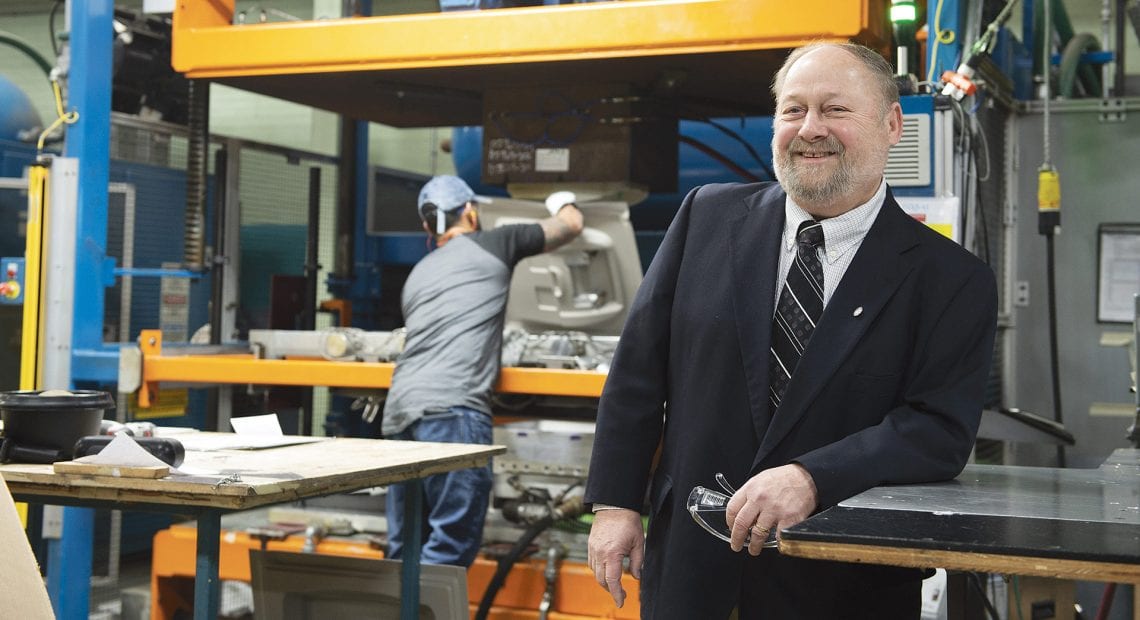
Joe Peters, Vice Chairman, Former President, Universal Plastics
This Business Leader Has Made a Career of Finding Ways to Give Back
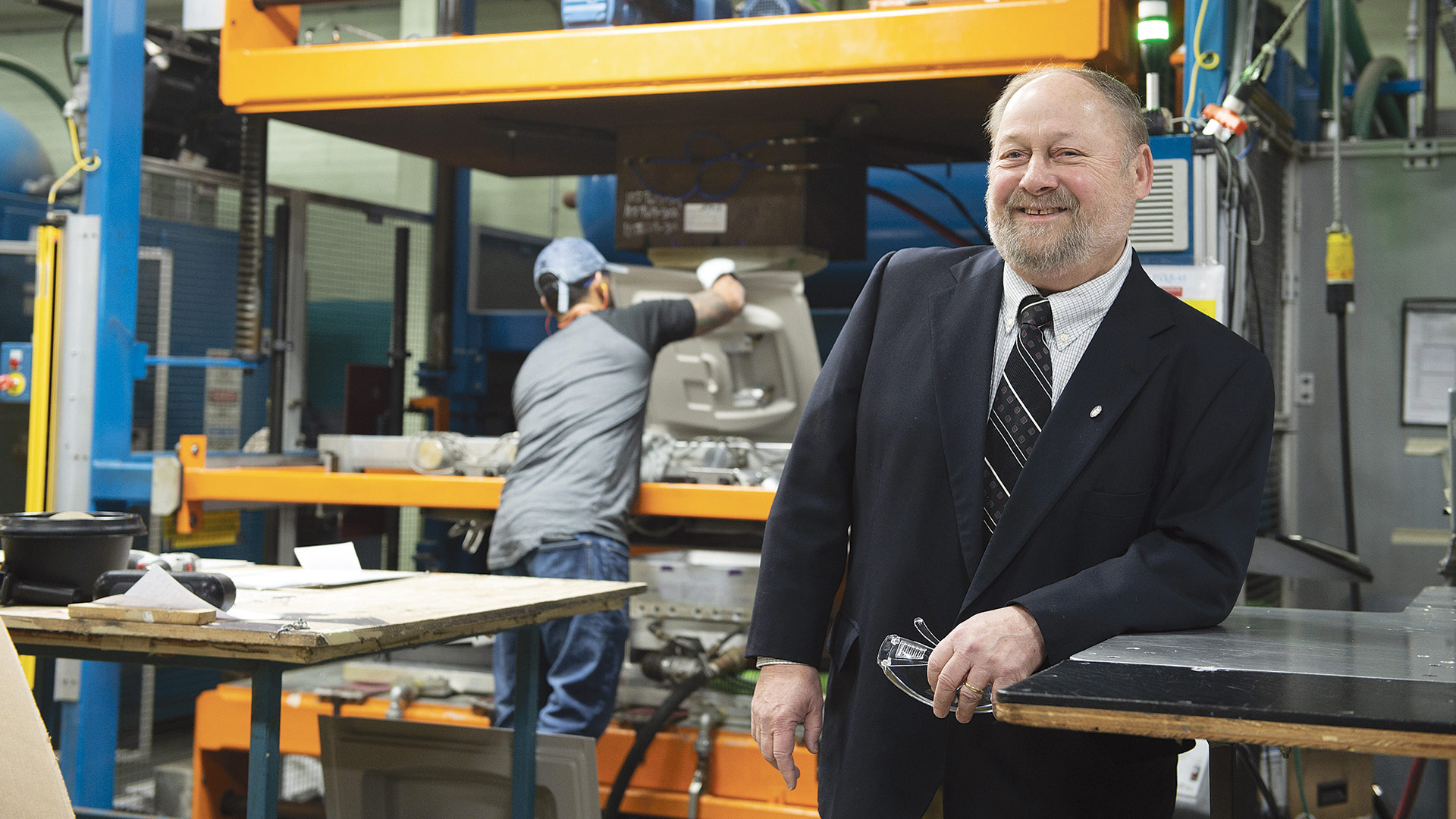
Joe Peters
‘El Gordito.’
That’s what the people of Guayape, Honduras started calling Joe Peters — according to his son, anyway, who relayed this bit of news while he was spending the summer of 1999 in that remote town working to help build a medical clinic.
That was about eight months after Hurricane Mitch parked itself over the country and dropped nearly six feet of rain on it, and about six months after his father came to visit, bringing much-needed medical supplies and, even more importantly, a pledge of sorts to help buy an ambulance for the impoverished community.
“‘El Gordito?’ … I’m thinking, ‘what the heck does that mean?’” Peters recalled, still laughing heartily as he retold a story he’s told dozens of times. “I’m thinking in my head that I’m some kind of big shot now, they’ve given me a nickname. Turns out, it means ‘short, fat guy’ — but in the nicest possible way.”
Actually, the good people of Guayape (pronounced guy-up-eh) have much more flattering phrases with which to describe Peters, who would eventually ride triumphantly, and pretty much to the point of embarrassment, from the airport into that town in the ambulance he raised money for (much more on that later), in a poignant episode that serves as a microcosm for his life, his service to the community — a term with broad meaning, to be sure — and the pattern he’s established for stepping in and making a difference in the lives of others.
Other examples abound — starting with the family business, Universal Plastics, which his father created and Joe started working for when he was a teenager. He grew it exponentially over the years, and while he and his brothers sold it to Jay and Pia Kumar in 2012, he remains active, representing the company in the community and still figuring some quotes here and there.
“Our goal here has always been to take all the good that Joe has done and build upon it further. I’m inspired by Joe’s commitment to our community and feel a strong sense of responsibility to continue his ongoing legacy. Joe doesn’t just make a difference, he also inspires others to do so, and this only amplifies his impact.”
But he’s always been active outside the walls of the plant, whether it was in Chicopee, where it was launched and remained until 2003, or in Holyoke, where it resides today. And active in many different ways, from being involved with the chamber of commerce or the Rotary Club to being the face of regional efforts to create summer jobs for young people; from getting involved regionally, and now on the state level, in a host of workforce issues to becoming a deacon at his church.
And then, there’s the ‘sandwich ministry,’ a name that certainly helps tell the story.
It’s an outreach program for the homeless in Chicopee, created to fill a gap when another soup kitchen relocated from the city’s downtown area to the Willimansett section and, eventually, had to stop serving meals on weekends as one of the conditions for its operation. And, yes, it’s mostly about sandwiches. Peters, one of its principal architects, explains:
“We saw this as an issue for the less-fortunate people in downtown Chicopee who couldn’t get to Willimansett,” he explained. “On weekends, they had nowhere to go, so we talked about it with the pastor and went about finding a solution.
“That was 10 years ago,” he went on. “We have a group of about 20 people who get together at the school and make lunches; we’re up to 160 sandwiches, which makes 80 lunches. We put two sandwiches in a bag with a banana and some cookies … it’s a little well-oiled machine at this point; we have a good staff of people, and we’re adding new volunteers regularly.”
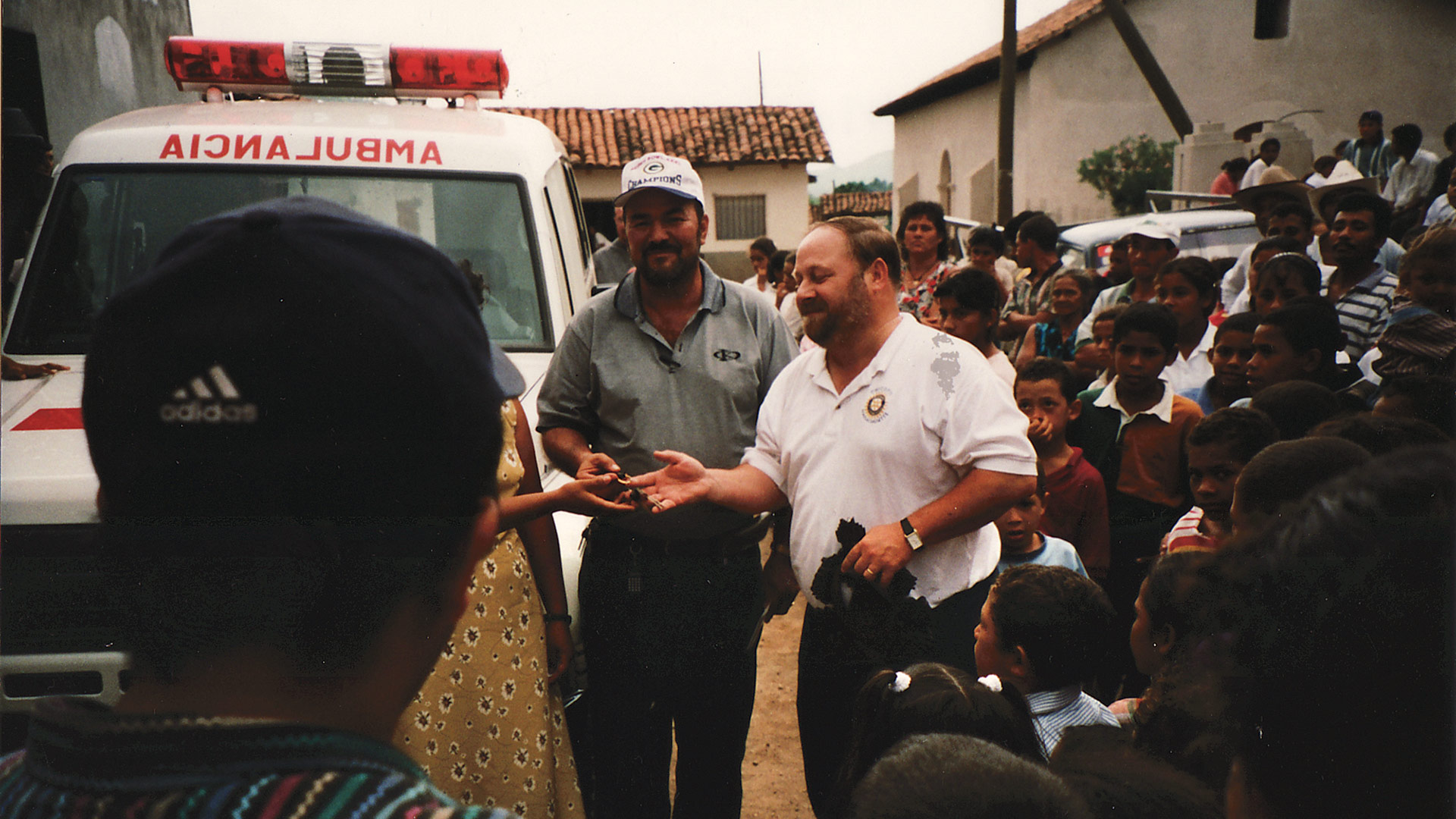
Joe Peters played a large role in bringing a new ambulance to the Honduran village of Guayape, which was devastated by Hurricane Mitch in 1998.
The sandwich ministry is another example of how Peters has seemingly always been there to help the city he still calls home — Chicopee — and be an employer willing to give people a chance, sometimes changing their life in the process.
People like Manny Cruz. He had been struggling for some time in his efforts to secure a job because of mistakes made earlier in his life, when he came to Universal Plastics via CareerPoint, now MassHire Holyoke, another organization to which Peters has given his time, energy, and talent. Today, he’s one of the company’s best CNC programmers.
He and Peters were honored by the state in 2014 as a success story when it comes to workforce development and manufacturing training. Peters has helped script many similar stories over the years, winning a number of different awards and citations. He now has another — BusinessWest’s Difference Makers award, which is given for many reasons, including the recipient’s ability to inspire others to want to make a difference as well.
Peters has been able to do just that, said Pia Kumar.
“Our goal here has always been to take all the good that Joe has done and build upon it further,” she told BusinessWest. “I’m inspired by Joe’s commitment to our community and feel a strong sense of responsibility to continue his ongoing legacy. Joe doesn’t just make a difference, he also inspires others to do so, and this only amplifies his impact.”
True to Form
The Universal Plastics saga — and therefore Joe Peters’ story — have been told more than a few times on the pages of BusinessWest since the magazine started publishing nearly 35 years ago.
The company’s story, and in some ways Joe’s as well, was forged by his father, James, the son of a farmer from Wisconsin, and one who knew early on that he didn’t want to be a farmer.
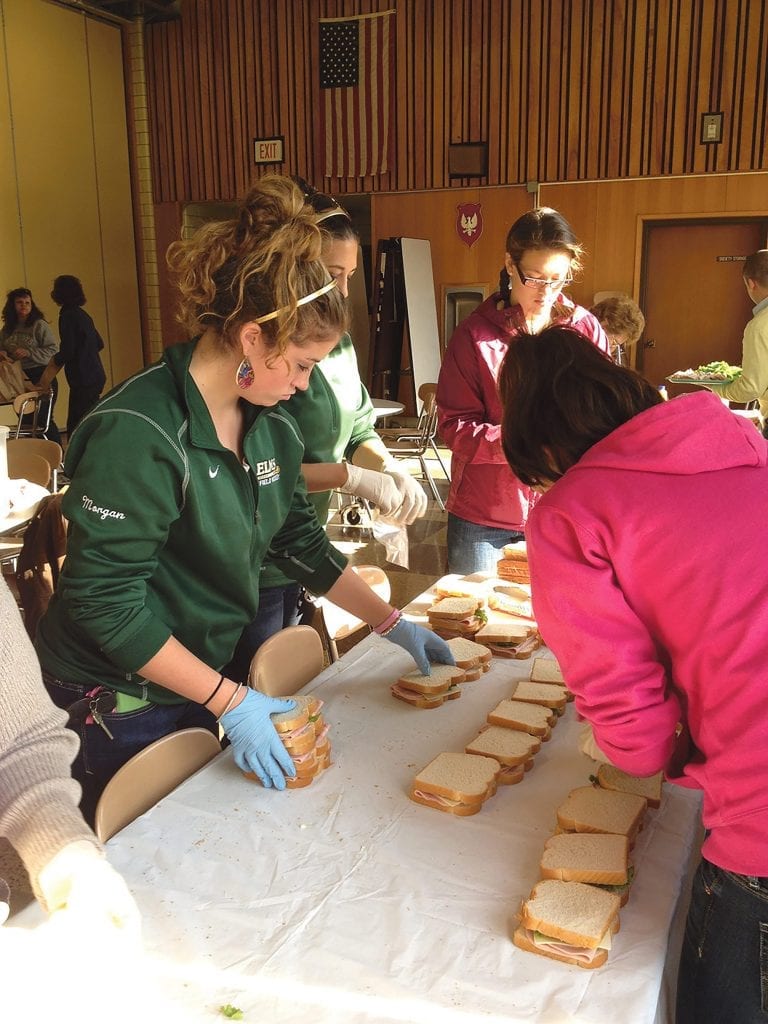
The ‘sandwich ministry’ is another example of Joe Peters’ commitment to helping those in need, especially in his hometown of Chicopee.
Instead, he joined the Army Air Corps and was assigned to work at Westover Air Force Base in the mid-1940s. He met Frances Ogarzalek at a polka dance and fell in love.
When the Westover facility became a major support base during the Berlin Airlift, James Peters, a flight engineer, served in Germany as an interpreter. He eventually became a sheet-metal worker with the Air Force repairing airplanes, his son recalled, later worked at Pratt & Whitney in the broad realm of R&D and prototype development, and eventually joined a plastics company in Chicopee.
“After 12 years there, he decided he could do this himself — and he did; he borrowed a little bit of money and started Universal Plastics in 1965,” said Peters, who was 15 at the time, and remembers going to his father’s shop with him as he was getting things off the ground.
“We’d go down at night while he was still working and building his first machine,” he recalled. “I had no idea what the machine was going to do, but I helped with the wrenches and screwdrivers, I’d light his cigarette when his hands were all greasy, and I’d answer the phone when my mother called to ask when we were coming home.
“It was a very humble beginning, but I fell in love with manufacturing,” he went on, adding that this love affair continues to this day, and he’s spent the latter part of his career trying to convince others to become equally enamored.
Over the years, Peters would lead Universal Plastics to steady growth and status as one of the leading producers of precision thermoformed plastics in this region, and the country, for that matter. The company produced everything from jet-engine covers to kayaks; from housing for computers and medical equipment to visors for riot helmets.
But while that one word — plastics — neatly sums up what went on at the family business, it doesn’t begin to define what would have to be considered Peters’ life’s work.
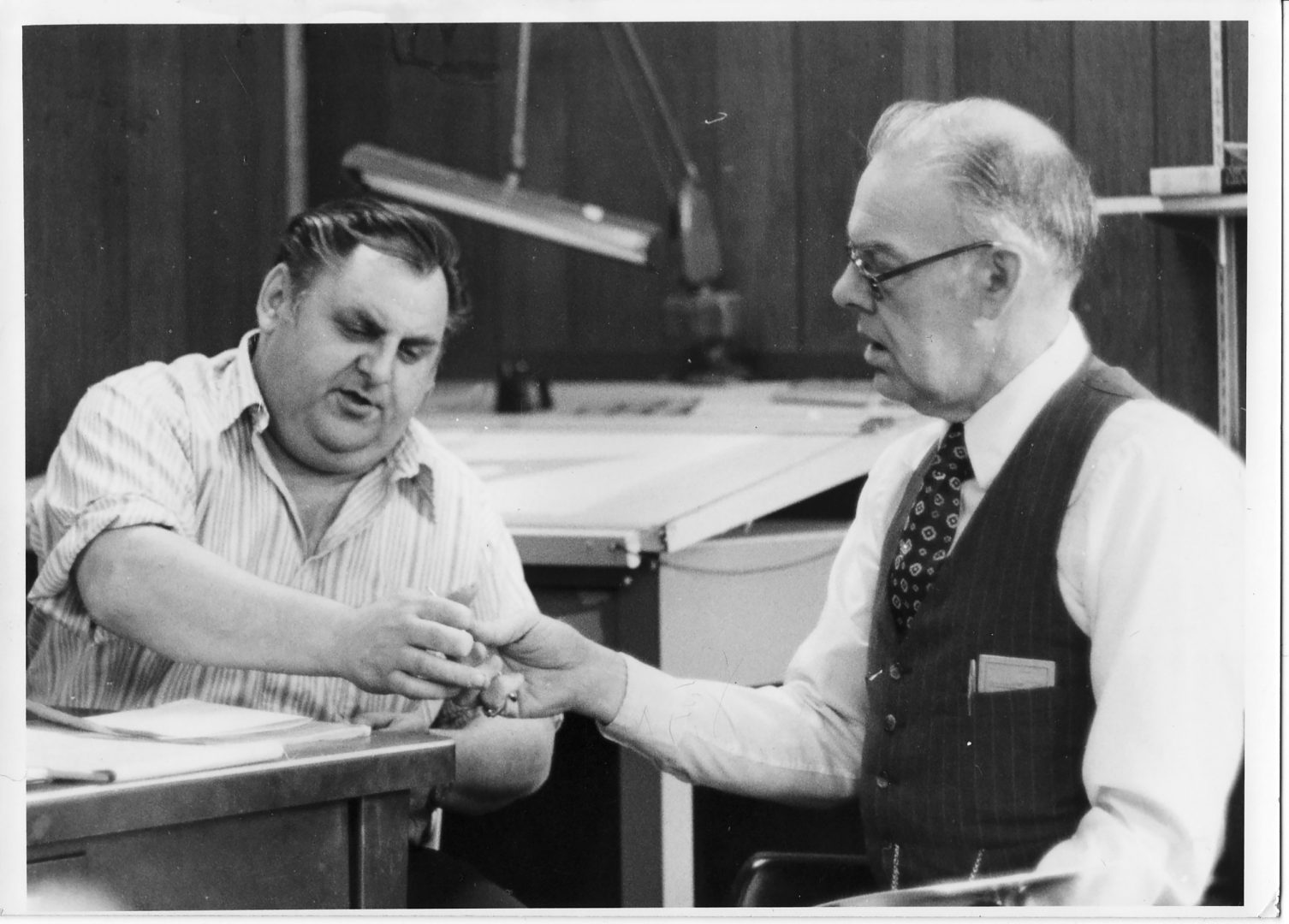
James Peters, left, started Universal Plastics and was a big believer in providing summer jobs to young people. His son, Joe, followed in his footsteps in both realms.
For that, we would need two words — giving back. Peters has been doing that consistently, and in many different ways, over the past several decades.
Examples abound, and one could start anywhere, but maybe the most appropriate place would be with one of the many things his father gave him, and he helps provide for countless others — a summer job.
Indeed, Peters has become the face and in many ways the driving force behind efforts to create summer jobs for area young people — positions that provide not just a paycheck, but invaluable lessons about the world of work and teamwork.
“These jobs are so important,” he said, adding that his father would always hire several young people for the summer, and he has continued that tradition while also working hard to help secure the funding needed to put more people to work. “The statistics bear it out — kids who work in summer jobs do a lot better in life than those who never did. Kids who have the perspective of having to work find it easier to get jobs later on and keep them.”
But summer jobs constitute just one facet of Peters’ work in the broad realm of workforce development, a task he took up as the manufacturing sector began to decline in the ’70s and ’80s and the profession became a harder sell for young people and their parents.
He was first appointed to the REB by Chicopee Mayor Richard Kos (during his first stint in the corner office at the start of this century) and has been there ever since.
And just a few months ago, he was named one of two Western Mass. representatives on the Mass. Workforce Assoc., a 15-member panel with a broad and significant charge that Peters boiled down to helping to make sure that the state’s employers have the workers they’ll need in the years to come.
“As a workforce board, we’ll have to be able to see two or three years into the future and say, ‘what are we going to need for employees — where is the market going?” he explained. “Healthcare has become a huge issue for the Regional Employment Board in terms of training and securing money from the federal government so that people are properly trained. Advanced manufacturing is another area of concern, among many others.
“Training is the probably biggest issue facing this region and the state as a whole,” he went on. “There are three populations we’re working with — young people, individuals who are working but are underemployed, and people who have been laid off and are missing from the workforce because they’ve just given up. In each case, training is the key to getting them into the workforce.”
Making His Mark
It’s been just over 20 years since Peters made that first trip to Guayape, but the memories are still etched in his mind.
So are the events leading up to it and all that has happened since. Telling the story as quickly as he could, he said it all started with a missionary friar from upstate New York, the Rev. Ronald Roll, who was doing a lot of work in Honduras and had been invited — via Peters and his long-time friend, the Rev. Placid Kaczorek, a priest from Chicopee — to speak to the Chicopee Rotary Club about his work and solicit some help.
“I was sitting in my office one day, and this little woman walked in and said to the secretary, ‘does the guy who’s trying to raise money for the ambulance work here?’”
Indeed, he was involved with a number of efforts in that country, from building bridges to securing safe water supplies, said Peters, adding that, in the weeks running up to his talk at the Rotary Club, he hinted that he would solicit help for one of those initiatives.
But when he reached the podium, he flipped the script somewhat. “He said, ‘I thought that maybe you guys would like to do a bigger project … they really need an ambulance in this particular village,’” Peters recalled, adding that, in the months afterward, Roll regularly e-mailed him with requests to come to Honduras for a visit.
Plans were eventually made for Peters, Kaczorek, and others to visit in December, he continued, and in between, Hurricane Mitch visited the country and stayed for several days.
“It flooded the country out … virtually every bridge was washed out; it was a mess,” he recalled. “We were trying to talk him out of letting us go, but he said, ‘no, no, you’ve got to come now.’”
They did, and the work of ‘El Gordito’ began.
Fast-forwarding significantly, he said the need for an ambulance was quickly verified — the nearest hospital was in the capital city of Tegucigalpa, more than 30 miles away, and there was often no way to transport people there — and Peters took the lead in a very ambitious effort to raise half the cost of the $45,000 ambulance and write a grant application to the Rotary Foundation to cover the other half.
The second part of the equation was relatively simple, and the first part … well, it wasn’t that difficult, either, thanks in part to a large story in the Republican — a reporter actually accompanied them on the trip to Honduras — and Peters’ energy, drive, and ability to inspire others.
One story that he loves to tell sums it all up.
“I was sitting in my office one day, and this little woman walked in and said to the secretary, ‘does the guy who’s trying to raise money for the ambulance work here?’” he recalled. “She sat down opposite me and said, ‘I want to give you some money for your ambulance.’ She pulled out her checkbook, wrote out ‘5,’ then ‘0,’ and I’m thinking to myself, ‘50 bucks, that’s great’ … then she writes another zero, and then another zero — 5,000 bucks! I was like, ‘can I hug you?’”
Throughout his life, Peters has been able to not only give back, but get others to join him as he does so, be it fellow Rotary Club members, his own sons, who went to Honduras in subsequent years, or fellow sandwich makers, including his wife, Jan, who have joined him in his new ministry.
“It’s meaningful to everyone … I think part of the reason people do things like this is that they get more out of them than they give,” he told BusinessWest. “When you see the gratitude on the faces of people, it reminds you why you’re there.
“We have days when we have more people than we do sandwiches,” he went on. “People will open their bags, and they’ll share their sandwiches with others. It really is a remarkable program.”
What’s in a Name?
Guayape, Honduras is a long way from Chicopee — and in all kinds of ways.
But Joe Peters found an important common denominator. In both places, he’s encountered people in need, and he’s stepped in to help — in a fashion that could be described as humble yet determined.
As he was on his way to the airport to return home from Honduras 20 years ago, a tired Peters, when asked about the plight of the people in that country, told that reporter from the Republican who went along on the trip, “I don’t have answers. I don’t think I can make a tremendous difference, but a little is better than no difference at all. I just wish there was more I could do.”
He was right with regard to that specific moment and place. But with regard to his career and all that he’s done within the community … he was way off the mark.
‘El Gordito’ has made a tremendous difference, and better still, he’s shown everyone that they can, too.
George O’Brien can be reached at [email protected]






